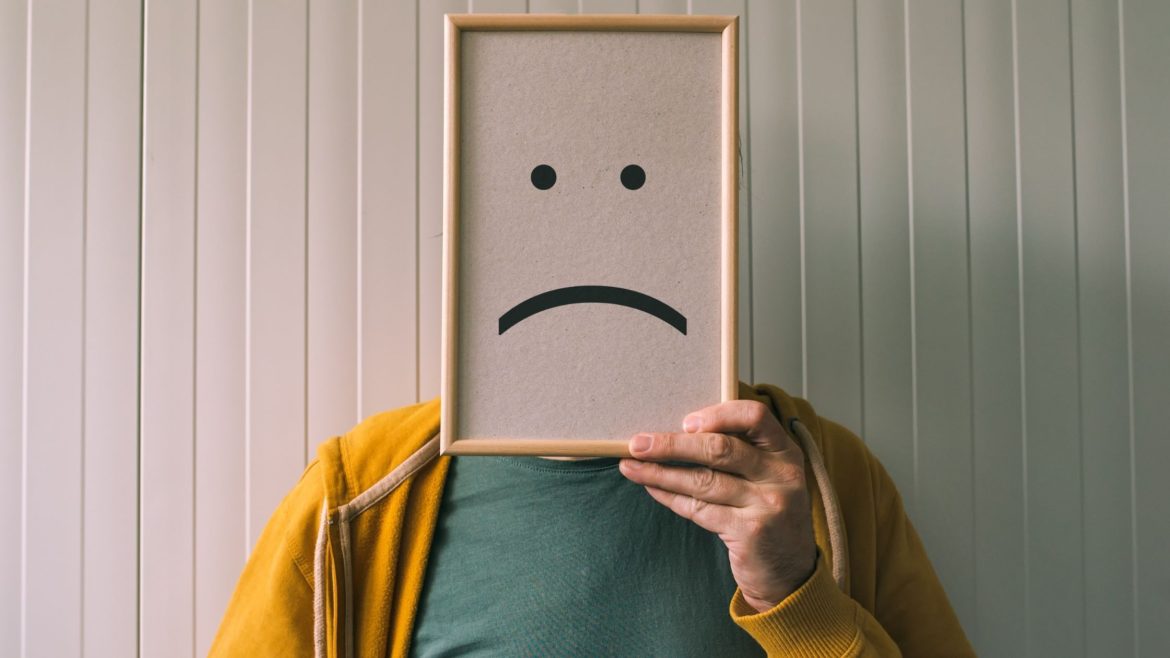
Depression – Signs, Causes, Treatment and Prevention
Depression, classified as a mood disorder and described as a feeling of extreme emotions of sadness, sorrow, loss, or anger intertwined with a person’s everyday activities. It has become fairly common all over the world, with no age barriers. According to a study done by the Centre of Disease Control and Prevention[source], 8.1 percent of American adults aged 20 and over had suffered from depression in the given period from 2013 to 2016. Everyone faces ups and downs in their life. While occasionally feeling sad or down is normal, but if this has become a regular part of life and you feel down quite frequently, then you might be suffering from depression. Without treatment depression only gets worse. People who reach out and seek help have seen a remarkable change in their life.
Signs and symptoms indicating depression
You must not miss out on the warning signs of depression, because only after you figure out what is happening you can ask for help and make your condition better. Depression is much more than just the feeling of ‘blue’.
Depression symptoms vary from person to person. Men, women, children all experience different symptoms of depression. For some people, it may affect the mood and for others, it may affect the body. For some, it may be continuous and for others, it may come and go.
Men are likely to experience symptoms relating to:
- Mood- irritability, aggressiveness, anxiousness
- Emotion- sad, hopeless, empty
- Behavior- substance abuse, interest in high-risk activities
- Cognition- lack of concentration, , difficulty in completing tasks, suicidal thoughts
- Sleep pattern- insomnia, restless sleep, excessive sleepiness
- Physically- fatigue, pains, headache, decreased libido
Women are likely to experience symptoms relating to:
- Mood- irritability, anger, anxious
- Emotion- sad, empty, hopelessness, helplessness, worthless
- Behavior- no social relations,
- Cognition- talking slowly, lack of concentration, suicidal thoughts, lack of decision-making skills, difficulty in completing tasks
- Sleep pattern- Insomnia or hypersomnia, disturbed sleep
- Physically- decreased energy, greater fatigue, decreased libido, aches, and pains
Children are likely to experience symptoms relating to:
- Mood- mood swings, crying
- Emotional- intense sadness, crying
- Behavior- avoiding friends and siblings, refusing to go to school
- Cognitive abilities- decline in performance, difficulty in concentrating
- Sleep patterns- difficulty in sleeping
- Physically- change in appetite, loss of energy
Feeling bad about yourself and life, thinking about failures, being pessimistic, feeling extremely tired all the time, not being able to concentrate, changes in the sleep pattern all these are the early signs of depression. One must not overlook these symptoms as they may lead to bigger problems in the future.
In case you notice any such symptoms, you can always reach out to us. We at Ufinity Life, provide you with counseling and therapy from experienced Mental Health Professionals who will help to improve your existing condition. Our mental health experts will cater to all your needs. You can consult us 24/7 when you see these symptoms. Based on an exhaustive and comprehensive study of your symptoms and past health issues, our experts will create a holistic treatment plan for you.
Causes of depression
There is no fixed reason why people suffer from depression. Some probable causes range from biological or circumstantial situations.
Some of the common reasons for depression are:
- Family history- a family history of depression increases your chances of suffering from it.
- Early childhood trauma- any event or trauma that you faced in your childhood may affect you in the future. Such events create fear in your mind and may lead to depression.
- Brain structure- less activity of the frontal lobe of your brain increases the risk for depression.
- Medical conditions- Certain medical conditions like chronic illness, insomnia, attention deficit hyperactivity disorder, etc may put you at higher risk.
- Substance use- drug and alcohol abuse highly affects your chances of depression.
Apart from the above-mentioned factors, other reasons include low self-esteem, personal history of mental illness, some specific medications, any stressful events in personal life, etc.
Types of depression
Depression can be categorized into various types depending upon the severity of symptoms. Some people experience mild and temporary episodes, while others experience severe and ongoing episodes of depression.
Broadly depression can be classified into two major types: major depressive disorder and persistent depressive disorder.
Major depressive disorder
Major depressive disorder is the more severe form of depression. You experience a continuous feeling of sadness, hopelessness, and worthlessness that always remains and won’t go away on your own.
To be clinically diagnosed with this form your depression you must experience at least 5 or more of the following symptoms for over a 2-week period:
- feeling depressed for most of the day
- lack of interest in most regular activities
- a significant change in weight: weight loss or gain
- sleeping a lot or not being able to sleep
- slowed thinking process and movement
- experiencing fatigue or low energy for most days
- feelings of worthlessness or guilt
- lack of concentration or indecisiveness
- recurring thoughts of death or suicide
Persistent depressive disorder
Persistent depressive disorder also called dysthymia, is a milder, but chronic, form of depression. This affects your life more than major depression as it lasts for a longer period of time.
To be clinically diagnosed with this form of depression, the following symptoms must last for at least 2 years. People who suffer from PDD, experience:
- lack of interest in normal daily activities
- feeling of hopeless
- lack of productivity
- low self-esteem
Depression can be treated successfully, but you need to identify and reach out for help. It is also important to stick to your treatment plan.
Treatment for depression
Living with depression can be difficult and painful. Treatment aims to improve your quality of life and get you back to normal. You must consult with your healthcare provider or a therapist about the possible options and the combination of treatments that will work the best for you. Depression can be cured with counseling along with a combination of medication when required.
The treatments include:
- Medications- When you consult a Psychiatrist, he may prescribe you antidepressants, anti-anxiety, antipsychotic medications based on your symptoms to treat depression.
- Psychotherapy- Counselling and therapy is an effective way for treating depression in combination with therapies like CBT, REBT etc. Therapists guide you through your negative feelings and bad memories and help you deal with cognitive distortions. You can also benefit from family or group therapy sessions.
- Light therapy- exposure to white light, help regulate the mood and improve the symptoms of depressions. When people suffer from major depressive disorder, light therapy is used.
- Exercise- Physical exercise becomes necessary to cure depression to deal with lack of energy. Exercise increases the production of endorphins in your body, which is responsible for improving your mood. However, it must be kept in mind that exercise alone cannot cure depression, it can only be an adjunct to the other modes of treatment.
- Avoid alcohol and drugs- drinking and abusing drugs may have an instant effect and make you feel better, but in the long run, these substances can lead to depression and anxiety and the symptoms may worsen in case of already existing condition.
- Setting boundaries- start setting boundaries both in your personal and professional life. Say no to things you don’t want to do. Feeling overwhelmed will only result in making your anxiety and depression symptoms worse.
- Supplements- various supplements are available which are known to have positive effects on depression. Some of the supplements are St. John’s wort, S-adenosyl-L-methionine (SAMe), 5-hydroxytryptophan (5-HTP), Omega-3 fatty acids. However, it is always advisable to consult your health care provider before you take up any supplement.
- Essential oils- these are considered to be natural remedies for many conditions.. Some of the preferred essential oils which can have an impact includes : wild ginger for activating serotonin receptors in the brain, bergamot for reducing anxiety, chamomile or rose oil are known to have short-term benefits.
- Vitamins- two vitamins are known to be beneficial for depression. The low level of Vitamin B12 and D in the body increases the risk of developing depression. Exposure to Vitamin D or sunshine also lowers the chances of suffering from depression.
- Self-care- getting a proper amount of sleep, eating a healthy diet, staying away from negative people, and participating in the activities that make you happy are some of the ways of self-care.
- Get a routine- a psychiatrist and director of the Depression Research and Clinic Program at UCLA says, you need a routine if you are depressed. As depression sucks out life out of your life, getting a routine will make you get back on track
Prevention of Depression
Depression is caused by some emotional changes, any big event in life, feeling left out, and so on. It does not have any fixed reason, but that doesn’t mean depression isn’t preventable. Depression is generally considered to be preventable. Once you identify that you are suffering from depression, or you encounter one such episode of depression, you must get prepared to avoid future episodes by learning which lifestyle changes and treatments are helpful. There are some simple ways in which you can prevent any future event from happening.
- Stop over-burdening yourself with stress, this will worsen the situation
- Get plenty of sleep, this will ensure your body gets the proper amount of rest
- Get out of your room or house and get some Vitamin D,
- Exercise regularly, physical activity is very essential
- Continue with your treatment, do not discontinue taking sessions or medicines as you have been prescribed
- Start working on your relations and build strong relationships. Reach out to people, be social
These may sound like very menial preventive measures but they are the best and safest methods. These steps will improve your condition and prevent you from any future episodes.
We at Ufinity Life understand your mental health and the importance of getting correct treatment for better outcomes. Medical condition like depression makes your every day difficult. For curing depression it needs the collaborative work of the patient and the mental health professionals. Keeping that in mind, we will schedule your sessions likewise, keep in check your progress, maintain the confidentiality required between the expert and patients, ensure you take up medicines on time, and take care of your exercise as well.
Especially for depression, we at Ufinity Life provide you a dedicated Health Coach and experienced therapists to help you manage your emotional changes and improve your condition. We will always stay in your contact and ensure that your mental health condition can be improved. With regular check-ups , automated reminders, alerts, and intervention as needed to minimize complications that can lead to further episodes. We provide you access to medical care from the safety and comfort of your home throughout the period of treatment and are available for your service all the time.
Join hands with us and ensure your good health & wellbeing.

We are committed to being your partner in health and source for expert medical guidance. See our panel of doctors here. Panel of Doctors